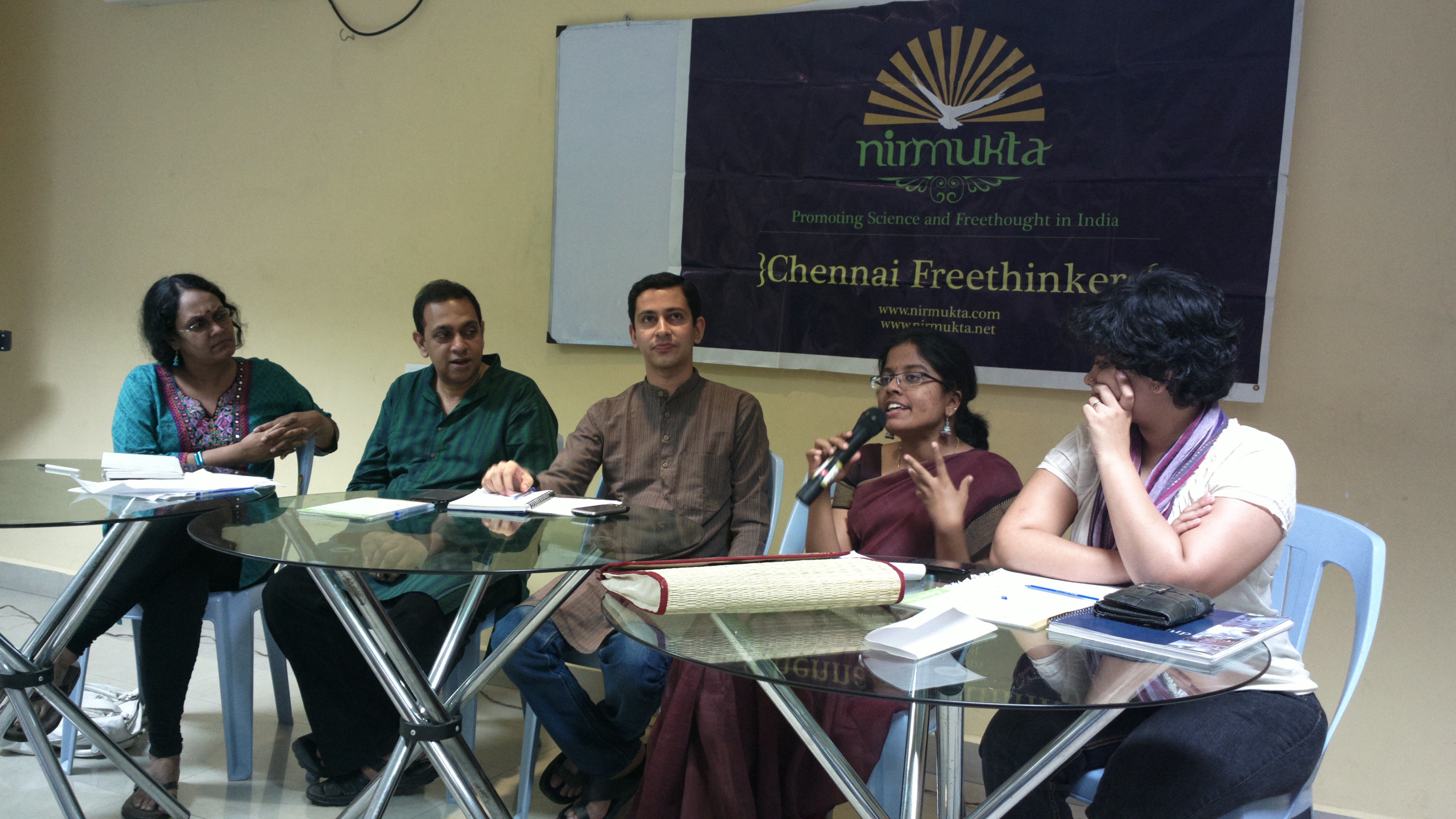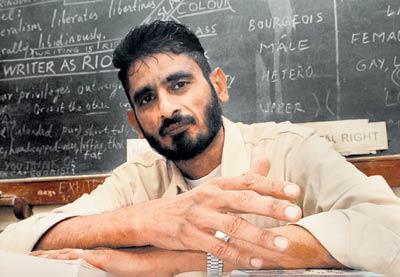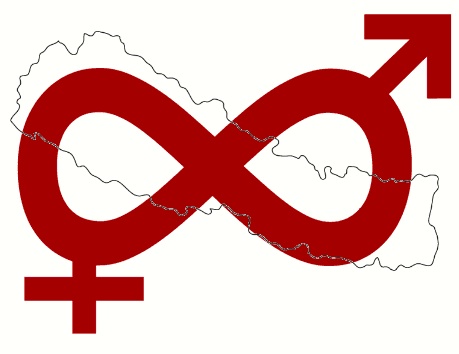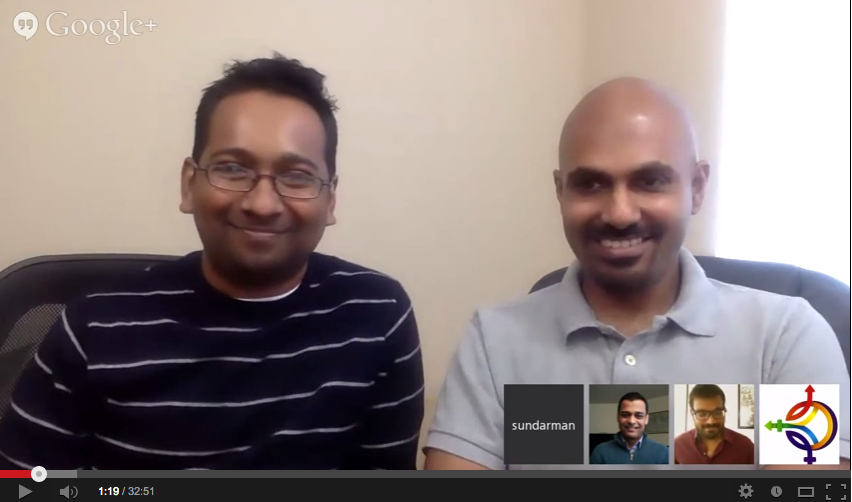Reason, Prejudice and the Case for LGBT Rights: report of a panel discussion held Feb 23, 2014

![[Image courtesy Soorya Sriram]](https://orinam.net/wp-content/uploads/2014/03/2014-02-23-CFT.jpg)
I entered the hall just when Vikram Sundarraman was introducing the panel and the discussion began. Dr.Kalpana Karunakaran led the talk with her insights on how it all began with man’s need to brand and establish his ownership not only over property but also on his kin and how it acted as a root cause for the advent of casteism and the numerous rotten rules imposed based on gender. This brief on patriarchy was an eye- opener, because it had never occurred to me that the reasons for some of the issues we face now are buried deeply in our society’s past. With that came the realization that it was not going to be easy for one to usher in a positive change. Difficult but not impossible.
Then it was the turn of our very own Ramki, who effortlessly transported us from the ancient India to a modern and hi-fi genetics lab where he discussed the commonly used arguments against homosexuality. Yes, you guessed it right, the “unnatural” word. He not only brought up a lot of examples to demonstrate how natural and widely prevalent homosexuality is among non-human vertebrate species. He also summarized the various arguments used in the past and present to disparage homosexuality. Some of these arguments are based on religious proscriptions, and others on limited or false understanding of the science. He conclude by pointing out that arguments rooted in biology/genetics are neither necessary nor sufficient to make the case for equal rights for all, regardless of sexuality or gender identity.
Then there was Mr.Ravi with arguments that could silence anyone who opposes LGBT equality in the name of religion. He cited various archaic religious texts which are not only clearly out dated and ludicrous in the present day context but also how they contain contradicting statements in themselves. Right from Manusmriti, the Vedas to the Christian scriptures, this man hardly left any stone unturned. He presented two approaches one could take to address homophobia grounded in religion: a confrontational attitude pointing out the ridiculousness of other religious strictures, or a conciliatory approach that draws on scriptural statements about love, compassion and respect for humanity.
Following him was Ms. Poongkhulali, who presented the most realistic picture of the legal battle surrounding Section 377 of the IPC. She compared the judgements of the Delhi High Court and the Supreme Court on the subject matter in 2009 and 2013, respectively, summarized the review petitions and potential legal steps ahead. She candidly pointed out the flaws in the legal reasoning, the callous way in which the Supreme Court overlooked the genuine reasons behind the review petititions and ignored the pleas of the LGBT supporters. It appeared, she said, that the Supreme Court had made up its mind to uphold 377, and later made up flimsy reasons to back up its decision. ‘
Then Ms. Shambhavi shifted the focus of the discusion from battling with the legal system to battles we fight within our families. Everytime I try to answer my friends’ questions about how am I going deal with my family when I have to come out to them, I am simply branded selfish and inconsiderate of others’ feelings. The way Shambhavi sensitively dealt with that topic put forward her justifications was very mature. She also spoke about alternative systems in place of patriarchal families.
The five course meal was not all: there were many amuse-bouches too. By this, I refer to the insightful questions by the audience. Several questions were raised on hetero-normative roles, sex education, LGBT in politics, the possible implications of decriminalizing consensual sexual acts. Each question brought in a different perspective on the topic. And the occasional funny comment to ease the mood was like a sip of a lemon chiller.
This event was the first time I had come across a large group of people who were not necessarily members of the LGBT community, but were refreshingly open to the views, justifications and opinions of the community. Usually when this topic is raised among my friends and colleagues, I tend to use personal arguments to make my case for equality. Following this panel, I now have tons of arguments – be they science or religion, social or legal.
I am determined to not stay silent ever again in a place where I feel the need to voice out for the cause. The next time I do so it would be not only for me but for my entire community. I strongly believe if these numbers of supporters can be amplified, then the courts have no alternative but to listen to our plea. Thanks to Chennai Freethinkers, its amicable volunteers, their wonderful hospitality and for jointly organizing this event with the Orinam group.
And about the Orinam group, this was the first time I had closely interacted with a group of LGBT activists and am glad it was with Orinam that I started. Every member was a delight to talk to, and the spirit and knowledge each member brought to the group was remarkable. The informative interactions, not to forget the sense of humour, are truly the hallmark of the group, and I am looking forward to be a part of many more events. Bon appetit!
Video below, courtesy Chennai Freethinkers [see errata**]:
https://www.youtube.com/watch?v=2xLsZ6u0SMU
** Errata:
26:25 Dr. Dean Hamer’s pedigree analysis suggested X-linked inheritance, not maternal inheritance
About: Thinkfest is the annual programme organized by Chennai Freethinkers, a regional group of Nirmukta, during which science popularizers, humanists and freethought activists are invited to share their ideas with the general public. The panel was enabled by Vikram Sundarraman, who describes himself as “someone who has questioned both gender and is religion for a long time and now passionately involved in promoting LGBT rights and freethinking.” The speakers were members and friends of Orinam, an organization working for the cause of LGBT rights.
The panel included:
• Dr. Kalpana Karunakaran, who has worked in the areas of gender, health and microcredit, and teaches in the Dept. of Humanities and Social Sciences at IIT Madras
• Poongkhulali B., an advocate practicing in the various courts in Madras
• Shambhavi, a volunteer with Orinam, based in Chennai
• Ravichander R. who works in an NGO providing education to under-privileged children
• Dr. L Ramakrishnan, a public health professional, biologist, and LGBT rights advocate from Chennai
This report was originally posted on movenpick, the mailing list of the Orinam collective, and has also been cross-posted on the Nirmukta site.





I enjoyed the talk very much, especially the points illuminated by Dr. Kalpana, Poongkhulali and Ravichander. I was already familiar with the content put forth by Dr.Ramakrishnan (Ramki), however, the vantage points of sociology, religious studies and Constitutional Law were refreshing for me.
Also, I empathize with Shambhavi’s irritation of “family” being considered the indivisible and sacred unit of social life.
Beautifully written! Thanks for this ManojKiran.